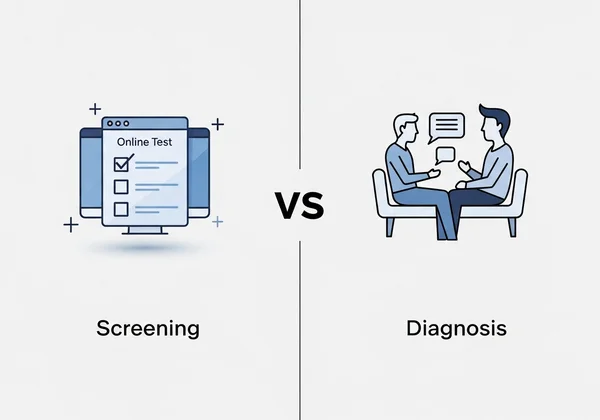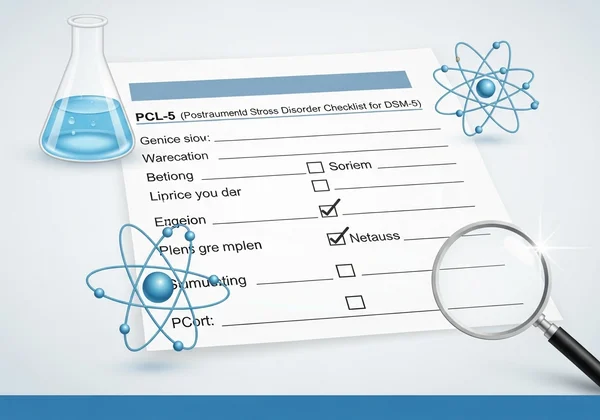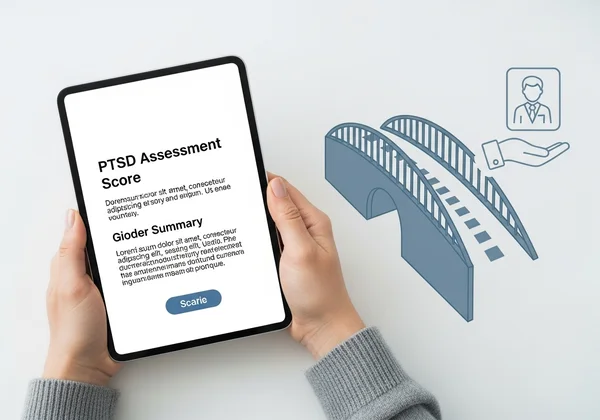Online PTSD Test Accuracy: Reliability & What to Expect
September 15, 2025 | By Henry Davis
Feeling overwhelmed by potential trauma symptoms can be an isolating experience. You might be searching for answers, wondering if what you're feeling is "normal," and asking yourself a critical question: "do i have ptsd test?". In this search for clarity, many people turn to an online PTSD test for initial insights. But with so many resources available, another question quickly follows: can you trust them? This guide will demystify the accuracy of online PTSD tests, explain what makes a tool reliable, and set clear expectations for what you can learn from a confidential assessment as a first step toward understanding your mental well-being.

Understanding Online PTSD Test Reliability & Validity
When you're looking for answers about your mental health, the words "reliability" and "validity" are paramount. In simple terms, a reliable test provides consistent results, while a valid test measures what it claims to measure. For someone seeking clarity on trauma symptoms, finding a trustworthy online tool is crucial. The goal of a well-designed online PTSD screening is not to give you a definitive label, but to provide a safe, private space to explore your symptoms and gain initial understanding.
A credible online test serves as a mirror, reflecting your experiences back to you in a structured way. It can help organize the confusing and often chaotic feelings that follow a traumatic event. It's crucial to understand these tools as powerful initial screeners, offering you valuable information. They mark the beginning of your journey toward understanding, not its end.
How Accurate Are Online PTSD Tests for Initial Screening?
For the purpose of initial screening, high-quality online PTSD tests can be remarkably accurate. These tests are designed to identify the presence and severity of symptoms that are consistent with Post-Traumatic Stress Disorder. Think of it like a home thermometer; it can't tell you if you have the flu or a common cold, but it can accurately tell you if you have a fever, indicating that something needs further attention.
Similarly, a scientifically-backed ptsd screening test effectively measures key symptom clusters associated with PTSD. These often include intrusive memories, avoidance behaviors, negative changes in mood, and alterations in arousal and reactivity. By answering questions related to these areas, the test can calculate a score that suggests whether your symptoms align with those of PTSD, providing a solid foundation for a more informed conversation with a healthcare professional. Taking a free PTSD test is a proactive and private way to gather this preliminary data.
Screening vs. Diagnosis: What Online Tests Can (and Cannot) Do
This is the most important distinction to understand: screening is not diagnosis. A clinical diagnosis of PTSD can only be made by a qualified mental health professional—such as a psychologist, psychiatrist, or licensed therapist—after a comprehensive evaluation. This clinical assessment involves in-depth interviews, a review of your medical history, and consideration of other factors that an online quiz cannot account for.
An online ptsd self test is a powerful informational tool.
- What it CAN do: Offer a confidential, pressure-free environment to self-assess your symptoms, provide immediate, data-driven insights based on your answers, and empower you with a summary you can share with a doctor.
- What it CANNOT do: Provide a formal medical diagnosis, understand the unique context of your trauma, or replace the nuanced judgment and therapeutic relationship offered by a human professional.
Using an online test is a responsible first step. It equips you with the knowledge to decide if seeking professional help is the right next move for you.

The Science Behind Reliable PTSD Assessments: PCL-5 & Beyond
The credibility of any psychological assessment rests on its scientific foundation. A random online quiz with vague questions won't offer meaningful insights. However, a PTSD assessment test built upon established clinical standards provides a much higher degree of trust and relevance. The best online tools are not just guessing; they are leveraging decades of psychological research to provide you with a reliable snapshot of your symptoms.
Our online assessment is based on the PCL-5, a widely respected standard in the mental health community. This commitment to scientific principles ensures that the feedback you receive is grounded in expertise and designed to be genuinely helpful. Understanding this foundation can help you feel more confident in the results you receive from a PCL-5 based test.
What is the PCL-5 and Why Does it Matter for PTSD Screening?
The PCL-5, or the PTSD Checklist for DSM-5, is a 20-item self-report questionnaire designed to measure the 20 symptoms of PTSD outlined in the Diagnostic and Statistical Manual of Mental Disorders, 5th Edition (DSM-5). It is considered a gold-standard tool used by clinicians and researchers worldwide to screen for PTSD and monitor symptom severity over time.
Its significance comes from its direct alignment with official diagnostic criteria. Each question corresponds to a specific symptom, ensuring the assessment is comprehensive and clinically relevant. When an online test adheres to the PCL-5 standard, you're essentially answering the same types of questions a therapist would use in an initial evaluation. This scientific foundation is what gives our online PTSD test its PCL-5 accuracy and makes it a trustworthy resource for self-assessment.

Key Factors Enhancing an Online Test's Credibility
When evaluating an online test for PTSD, look for several key markers of trustworthiness. These elements separate a helpful tool from a dubious one and ensure your experience is safe, private, and constructive.
- Confidentiality and Anonymity: Your privacy is non-negotiable. A credible test will never require you to share identifying personal information. It should be a completely anonymous experience.
- Based on Scientific Standards: The tool should explicitly state its methodology. Look for mentions of the PCL-5 or other evidence-based screening instruments.
- Clear Disclaimers: A responsible platform will always be upfront that its test is a screening tool, not a substitute for a professional diagnosis.
- Actionable Next Steps: The results should do more than just give you a number. They should offer context and provide clear, gentle guidance on what to do next, including strongly encouraging consultation with a professional.
What to Expect from Your Online PTSD Test Results
Completing an online ptsd symptoms test is a significant step. It's natural to feel a mix of anxiety and anticipation about the results. A well-designed platform will present your results in a way that is clear, supportive, and empowering, not alarming. The goal is to provide you with insights that you can use to move forward in your healing journey, armed with better self-awareness.
Remember, the results are a reflection of your current state, based on your self-reported experiences. They are a starting point for deeper understanding, not a final judgment. Whether your score is high or low, the information you gain is valuable for your personal growth and well-being. A free online test can be the first step to clarity.
Interpreting Your Self-Assessment Score & Insights
After completing the questionnaire, you will typically receive a self-assessment score. This score is calculated based on your responses and corresponds to a certain level of symptom severity—mild, moderate, or severe. Rather than fixating on the number itself, focus on the insights it provides. The results summary should help you identify which symptom clusters are most prominent for you.
For example, you might see that you scored highly in areas related to intrusive thoughts but lower in avoidance. This kind of detailed feedback is incredibly useful. On our platform, you can also receive an optional, AI-driven personalized report that offers deeper insights into your personal strengths, challenges, and potential next steps, making the results even more actionable. Consider exploring the PTSD self-test to see how it works.
Your Next Steps: When to Seek Professional Guidance
Your results are a guide for what to do next. If your score suggests a moderate to high likelihood of PTSD symptoms, this is a strong indicator that seeking professional guidance is a beneficial next step. Taking this step is a sign of strength and self-awareness. You can bring your results summary to a therapist or doctor as a starting point for discussion.
Having this data in hand can make that first conversation feel less daunting. You're not starting from scratch; you're starting with information. Even if your score is low, but you are still struggling, speaking with a professional is always a valid and helpful option. Let your test results be the catalyst for positive action. You can begin your test now to take that first step.

Ready for Your Confidential PTSD Self-Assessment?
Navigating the aftermath of trauma is a deeply personal journey, and seeking clarity is a brave first step. We've seen that while online tools cannot replace a professional diagnosis, a scientifically-backed PTSD test is a reliable and accurate way to conduct an initial screening. By using established standards like the PCL-5, these assessments offer a trustworthy and confidential space to understand your symptoms.
If you are ready to gain valuable insights into your well-being, we encourage you to try our free, confidential, and science-based assessment. Taking the test can provide the clarity you need to decide on your next steps toward healing and recovery. Start your PTSD test today.
Frequently Asked Questions About Online PTSD Tests
How accurate are online PTSD tests?
High-quality online PTSD tests based on clinical standards like the PCL-5 are very accurate for screening purposes. They reliably identify the presence and severity of symptoms consistent with PTSD, making them an excellent first step for self-assessment.
Can an online PTSD test replace a professional diagnosis?
No. An online test is a screening tool, not a diagnostic instrument. A formal diagnosis can only be provided by a qualified mental health professional after a comprehensive, in-person evaluation. The test is designed to be a bridge to professional help, not a replacement for it.
What are the benefits of taking a confidential PTSD test online?
The primary benefits are privacy, accessibility, and the absence of judgment. It allows you to explore your symptoms in a safe, anonymous environment at your own pace. The results from a reliable online test can empower you with the information needed to seek further support.
What should I do after taking an online PTSD test?
After taking the test, carefully review your results and the insights provided. If your score indicates the presence of significant symptoms, or if you continue to feel distressed regardless of the score, it is highly recommended to schedule a consultation with a doctor or mental health therapist to discuss your results and determine the best path forward.